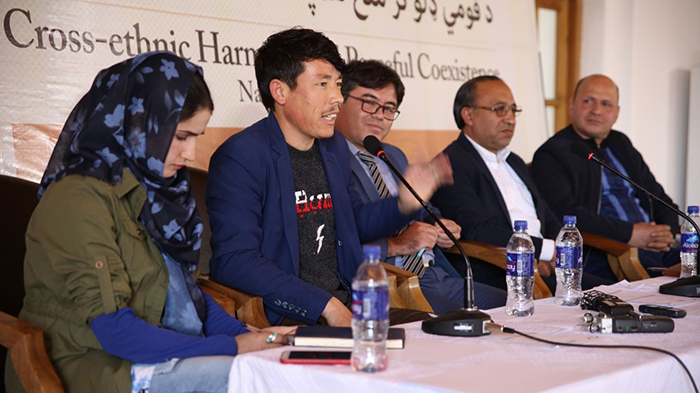Afghanistan Human Rights and Democracy Organization (AHRDO), a Kabul-based rights and research organization, brought Afghan activists from major Afghan cities and different ethno-linguistic communities to discuss about a social issue: ethnic conflict in Afghanistan. Years of power struggle and war coupled with a traditional narrative have made the topic too a complex matter. This Kabul-based rights and research organization is trying to bring Afghan activists together aiming to promote peaceful coexistence at a time when political division is on the rise.
Until April 1978 the ethnically diversified Afghanistan was ruled by predominantly Pashtun dynasty of Mohammadzais. The April coup in 1978 led by leftist Afghan army generals and Soviet-backed Peoples’ Democratic Party of Afghanistan opened the Pandora’s Box of new conflict in the country. With a socialist approach, though successive communist regimes in Kabul put efforts to address public and tribal resentment but little was achieved by time the last Soviet-backed Afghan president Najibullah was on the lead to rule the country.
With collapse of Soviet Union, mujahedeen took control over Kabul in 1992. Under the mujahedeen, Kabul turned into a cockpit of civil war, all ethnic factions struggling to have a share in power.
Jawad Zawolistani, managing director for AHRDO, says ethnic conflict remains a major challenge ahead of the conflict-stricken Afghanistan. Ever since 2015 AHRDO has been working on conflict resolution, conducting seminars and talks to raise awareness on how to resolve the issue, Mr. Zawolistani said.
Conducting a 15-day conflict study seminar, AHRDO brought as many as 110 civil activists—from Herat, Mazar-e-Sharif, Nangarhar, Bamyan and Kabul—together to talk over ethnic conflict, its causes and effects on social relation.
Ismail Zaki, a civil activist from Bamyan, who took part in the seminar, titled Cross-ethnic Harmony and Peaceful Coexistence National Conference, held here in Kabul on Thursday, October 07, acknowledges that his understanding of the ethnic conflict in Afghanistan used to be narrow. Ethnic conflict is a complex and sensitive problem, he said, having taken part in roundtable discussions organized by AHRDO.
My understanding of the ethnic conflict in Afghanistan used to be narrow. Ethnic conflict is a complex and sensitive problem.
Ismail Zaki
Mohammad Kabir Esar, member of Herat Provincial Council, who took part in the seminar, is of the opinion that ethnic conflict will not be addressed unless there is a national consensus. Mr. Esar notes the 15-day roundtable discussion enabled him to see a larger picture of ethnic conflict, which is a multi-layered and complex phenomenon.
Traditional narrative
The traditional narrative—developed over centuries— tempts to underestimate the complex story existing behind ethnic conflict in Afghanistan. Over years Afghan rulers have put efforts to homogenize the ethnically diversified population living in the country. But the full picture of an inclusive perspective is more complex.
Shaharzad Akbar, the head of Independent Afghanistan Human Rights Commission, who was a panelist, says new Afghan political system has failed to address the ongoing conflict in the country. Ms. Akbar underlines ethnic identities do not necessarily make conflict; it is a deep sense of resentment, misrepresentation and underrepresentation that cause conflict in Afghanistan. Inequality coupled with unfair distribution of power and sources have led to inflame conflict, she said.
Sayed Askar Musawi, who is author and university lecturer, believes ethnic conflict in Afghanistan is a state-architected phenomenon but warns it will cause disaster if not addressed properly.
Orzala Ashraf Nemat, head of AREU, a Kabul-based research institute, who was the third speaker of the event, said objective development program will play a crucially important role in peaceful coexistence but warned that biased distribution of resources would inflame conflict among ethnic groups.
Mohammad Hussain Saramad, communication officer at AHRDO, says the Afghan governments have a selective approach on ethnic conflict but AHRDO is committed to bring this question under more scholarly inquiry at grass-root level, Mr. Saramad said.




